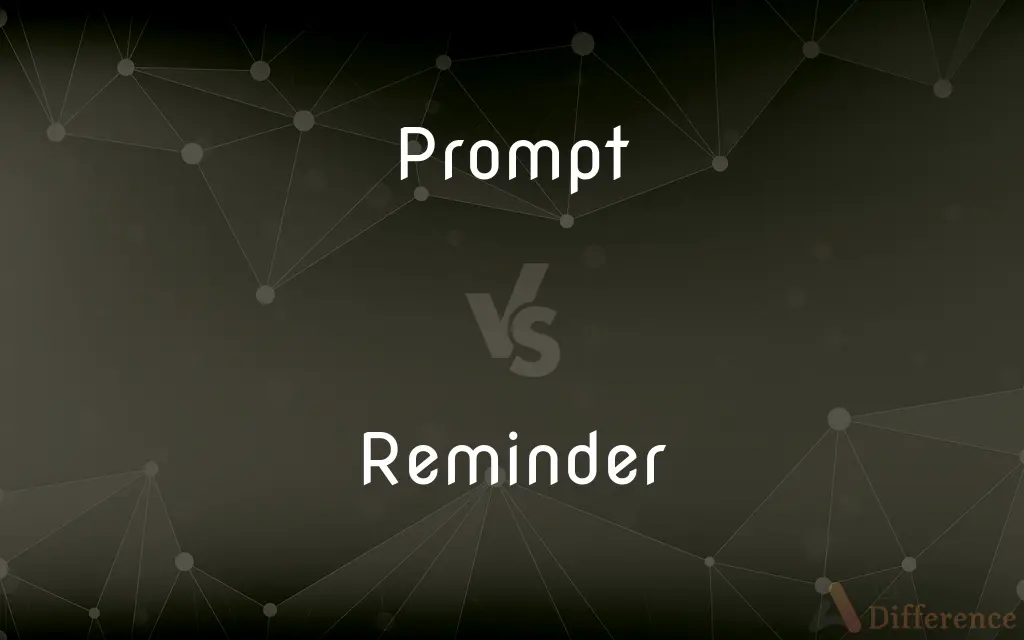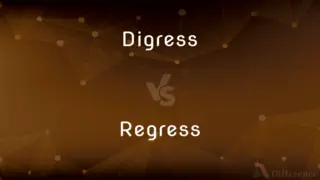Prompt vs. Reminder — What's the Difference?
By Fiza Rafique & Urooj Arif — Updated on March 14, 2024
A prompt encourages immediate action or response, while a reminder brings something back to attention, often for future action.

Difference Between Prompt and Reminder
Table of Contents
ADVERTISEMENT
Key Differences
Prompts are designed to elicit an immediate response or action, often used in contexts like user interfaces or conversations to initiate immediate engagement. Reminders, on the other hand, serve to jog memory or alert to upcoming tasks or deadlines, focusing on rekindling awareness for future actions.
While prompts are immediate and direct, aiming to guide behavior or responses at the moment, reminders are more about maintaining awareness and preventing oversight of tasks, appointments, or important dates that may not require immediate action.
Prompts often come in the form of questions, instructions, or alerts that seek to engage the user or participant without delay, pushing towards a next step or decision. Reminders, however, are typically notifications or cues that bring something back into focus, ensuring that it stays on one's radar for attention when needed.
In user experience design, prompts are crucial for navigating users through interfaces, providing clear calls to action. Reminders play a vital role in time management and organization, helping individuals keep track of obligations and commitments.
The distinction between a prompt and a reminder lies not just in their timing but in their intent; prompts are about immediate engagement, while reminders are about future-oriented awareness and preparation.
ADVERTISEMENT
Comparison Chart
Purpose
Elicit immediate response or action
Jog memory or alert to future tasks
Timing
Immediate
Future-oriented
Common Forms
Questions, instructions, alerts
Notifications, cues, alerts
Context
User interfaces, conversations
Time management, organization
Intent
Guide behavior or responses now
Maintain awareness for future actions
Compare with Definitions
Prompt
A cue that encourages immediate action or response.
The login screen prompt asked for a username and password.
Reminder
A tool or message designed to keep a task or event in mind.
She set a reminder for her doctor's appointment next week.
Prompt
An intervention to initiate conversation or thought.
The therapist used a prompt to encourage the client to open up.
Reminder
An alert to prevent forgetting something important.
His phone reminder saved him from missing the deadline.
Prompt
An immediate call to engage in a specific activity.
The teacher's prompt got the students started on their projects.
Reminder
A cue to bring a past memory or task back to attention.
The sticky note on the fridge served as a reminder to buy milk.
Prompt
A tool used in interfaces to guide user actions.
The software's setup prompt guided the installation process.
Reminder
Often used in time management to organize tasks.
Reminders in her calendar kept her on track with her assignments.
Prompt
A direct request for information or action.
The form included a prompt for emergency contact details.
Reminder
A notification for upcoming events or deadlines.
The meeting reminder popped up 10 minutes before it was due to start.
Prompt
Being on time; punctual.
Reminder
To cause to remember; put in mind
Must remind him to call.
Reminded her of college days.
Prompt
Carried out or performed without delay
A prompt reply.
Reminder
Someone or something that reminds.
He left a note as a reminder to get groceries.
Prompt
To move to act; spur; incite
A noise prompted the guard to go back and investigate.
Reminder
(finance) Writing that reminds of open payments.
She ignored first the reminder of 80 cents. At the end, she was sentenced to pay 200 euros!
Prompt
To give rise to; inspire
The accident prompted a review of school safety policy.
Reminder
One who, or that which, reminds; that which serves to awaken remembrance.
Prompt
To assist with a reminder; remind.
Reminder
A message that helps you remember something;
He ignored his wife's reminders
Prompt
To assist (an actor or reciter) by providing the next words of a forgotten passage; cue.
Reminder
An experience that causes you to remember something
Prompt
The act of prompting or giving a cue.
Reminder
Someone who gives a warning so that a mistake can be avoided
Prompt
A reminder or cue.
Prompt
(Computers) A symbol that appears on a monitor to indicate that the computer is ready to receive input.
Prompt
Something which inspires a response, especially a statement or series of questions designed to provoke creative or critical thought from a student
In English class today, the teacher gave us the prompt for our final essay.
Prompt
Quick; acting without delay.
He was very prompt at getting a new job.
Prompt
On time; punctual.
Be prompt for your appointment.
Prompt
(archaic) Ready; willing to act.
Prompt
A reminder or cue.
Prompt
A time limit given for payment of an account for produce purchased, this limit varying with different goods.
Prompt
(computing) A sequence of characters that is displayed to indicate that a computer is ready to receive input.
I filled in my name where the prompt appeared on the computer screen but my account wasn't recognized.
Prompt
(writing) A suggestion for inspiration given to an author.
Prompt
(transitive) To lead (someone) toward what they should say or do.
I prompted him to get a new job.
Prompt
To show or tell an actor/person the words they should be saying, or actions they should be doing.
If he forgets his words I will prompt him.
Prompt
(transitive) To initiate; to cause or lead to.
Prompt
Ready and quick to act as occasion demands; meeting requirements readily; not slow, dilatory, or hesitating in decision or action; responding on the instant; immediate; as, prompt in obedience or compliance; - said of persons.
Very discerning and prompt in giving orders.
Tell him I am promptTo lay my crown at's feet.
And you, perhaps, too prompt in your replies.
Prompt
Done or rendered quickly, readily, or immediately; given without delay or hesitation; - said of conduct; as, prompt assistance.
When Washington heard the voice of his country in distress,his obedience was prompt.
Prompt
Easy; unobstructed.
The reception of the light into the body of the building was very prompt.
Prompt
A limit of time given for payment of an account for produce purchased, this limit varying with different goods. See Prompt-note.
To cover any probable difference of price which might arise before the expiration of the prompt, which for this article [tea] is three months.
Prompt
To assist or induce the action of; to move to action; to instigate; to incite.
God first . . . prompted on the infirmities of the infant world by temporal prosperity.
Prompt
To suggest; to dictate.
And whispering angles prompt her golden dreams.
Prompt
To remind, as an actor or an orator, of words or topics forgotten.
Prompt
A cue given to a performer (usually the beginning of the next line to be spoken);
The audience could hear his prompting
Prompt
(computer science) a symbol that appears on the computer screen to indicate that the computer is ready to receive a command
Prompt
Give an incentive for action;
This moved me to sacrifice my career
Prompt
Serve as the inciting cause of;
She prompted me to call my relatives
Prompt
Assist (somebody acting or reciting) by suggesting the next words of something forgotten or imperfectly learned
Prompt
According to schedule or without delay;
They were always on time
A prompt reply
Prompt
Characterized by speed and efficiency
Prompt
Quick in apprehending or reacting;
A prompt (or ready) response
A prompt smile
Prompt
Performed with little or no delay;
An immediate reply to my letter
Prompt obedience
Was quick to respond
A straightaway denial
Common Curiosities
How does a reminder differ from a prompt?
A reminder is designed to bring something back to one's attention for future consideration, unlike a prompt, which seeks immediate engagement.
How are prompts used in technology?
In technology, prompts guide users through tasks, helping navigate interfaces, complete forms, or make decisions.
What are common forms of reminders?
Reminders can take the form of alarms, notification alerts, marked calendar dates, or even physical notes.
How do reminders help with productivity?
Reminders keep tasks and deadlines on one's radar, aiding in better time management and preventing important activities from being overlooked.
Why are reminders important?
Reminders help manage tasks, appointments, and deadlines, ensuring important things are not forgotten and are addressed in a timely manner.
How can reminders be personalized?
Reminders can be personalized by setting specific times, adding notes, or choosing alert tones that resonate with the individual's preferences.
Is a prompt always a question?
Not always; prompts can be statements or instructions that lead to an action, not just questions.
What is a prompt?
A prompt is an immediate cue or instruction that encourages a person to take action or respond.
Can a prompt also serve as a reminder?
While a prompt is for immediate action, it may indirectly remind someone of a related task or information, but its primary purpose is immediate engagement.
Can reminders be automated?
Yes, many digital platforms allow for automated reminders, which can be set for specific tasks, appointments, or recurring events.
How do people typically use reminders in their daily life?
People use reminders for a variety of tasks, including taking medication, attending meetings, paying bills, or completing household chores.
Can a prompt be ignored?
Yes, prompts can be ignored, but they are designed to be noticeable and encourage immediate action, making them harder to overlook.
Are prompts only used in digital interfaces?
While common in digital interfaces, prompts are also used in real-life situations, such as in classrooms or therapy sessions, to elicit responses or actions.
What makes an effective prompt?
An effective prompt is clear, concise, and designed to elicit a specific action or response without ambiguity.
Can prompts and reminders be customized in digital tools?
Yes, many digital tools and applications allow users to customize prompts and reminders according to their needs and preferences.
Share Your Discovery

Previous Comparison
Safe vs. Strongbox
Next Comparison
Digress vs. RegressAuthor Spotlight
Written by
Fiza RafiqueFiza Rafique is a skilled content writer at AskDifference.com, where she meticulously refines and enhances written pieces. Drawing from her vast editorial expertise, Fiza ensures clarity, accuracy, and precision in every article. Passionate about language, she continually seeks to elevate the quality of content for readers worldwide.
Co-written by
Urooj ArifUrooj is a skilled content writer at Ask Difference, known for her exceptional ability to simplify complex topics into engaging and informative content. With a passion for research and a flair for clear, concise writing, she consistently delivers articles that resonate with our diverse audience.












































